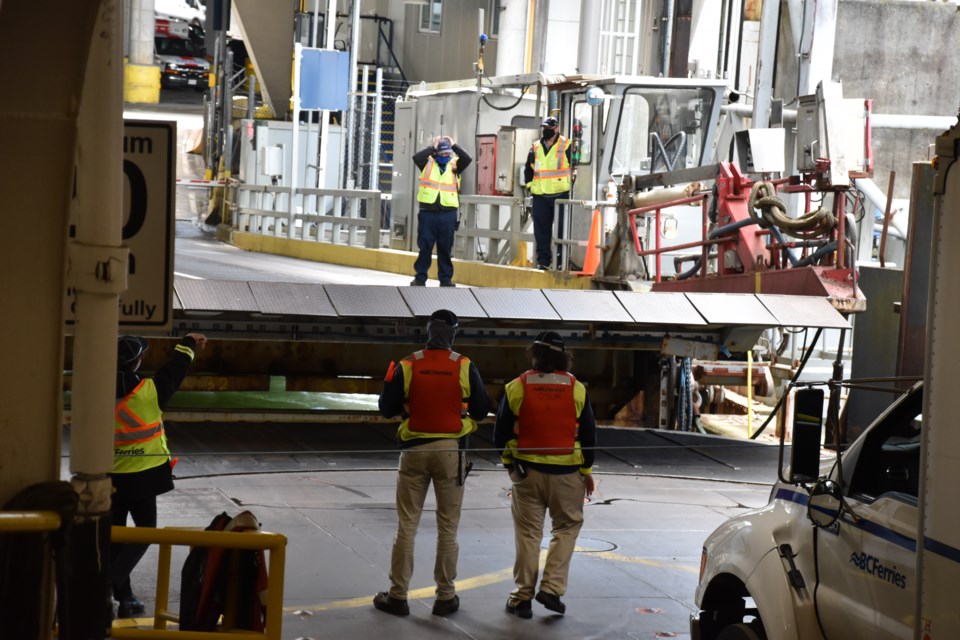Local politicians have joined residents in calling for the new travel restrictions imposed by Public Safety Minister Mike Farnworth last week to ban non-essential visitors to the Sunshine Coast.
“We’ve got a huge population living in Vancouver, right adjacent to us. That population is going to be looking for some place to go. They can’t go to the Island so they may as well come to the Sunshine Coast. And that’s really just unfair,” Gibsons Mayor Bill Beamish told Coast Reporter on April 26.
Since last Friday’s announcement, residents have been writing letters to local and provincial politicians demanding travel be restricted to the Sunshine Coast.
Sunshine Coast Regional District (SCRD) chair Lori Pratt said the issue was raised as “an item of concern” during a meeting with MLA Nicholas Simons and MP Patrick Weiler on April 23, noting the MLA “is certainly aware of how I feel about it.”
Pratt said the Sunshine Coast, as a ferry-bound community, could be isolated from the rest of the Vancouver Coastal and Fraser Health regions. “It does put us in danger of having a higher transmission rate happen in our small community. It does worry me, it does concern me,” she said.
Sunshine Coast elected officials spoke with Farnworth April 27, and they reiterated concerns about not having legal restrictions in place, said Pratt. However, she said while Farnworth committed to taking their concerns to Health Minister Adrian Dix, “right now it’s not going to change from the way it is.”
In an April 23 release, BC Ferries said customers will be denied passage on ferries connecting regional zones if their travel is deemed non-essential and will rely on “other jurisdictional authorities for assistance with enforcement of this Order.”
The order applies to Tsawwassen and Horseshoe Bay routes to Vancouver Island, as well as the Comox-Powell River and Port Hardy-Prince Rupert routes, but doesn’t apply to routes within regional zones, including the Langdale-Horseshoe Bay and Earls Cove-Saltery Bay routes.
In response to a request for comment from Farnworth on the rationale for his order, Coast Reporter was told by Emergency Management BC that the order is based on the advice of provincial health officer Bonnie Henry “to restrict travel between Health Authority regions.”
“The advice from Dr. Henry and the provincial government is to stay local and not travel beyond your community. That means we continue to strongly urge people to avoid travel within regions as well,” said the statement. “If you live in Vancouver, do not spend a weekend on the Sunshine Coast.”
Lines demarcating the three regional zones announced as part of the April 23 order fall largely along health authority boundaries; however, there are exceptions.
Fraser Health has been combined with Vancouver Coastal Health to form one regional zone, but the city of Hope, which is normally part of Fraser Health, has been included in the Northern and Interior Health zone. Vancouver Island makes up the third regional zone.
When asked during the announcement on Friday about his rationale for splitting the province into three regional zones, Farnworth said it was a “common-sense approach.”
“What we’re acknowledging is the complication of two significant health authorities in the Lower Mainland where people cross back and forth every single day to work, and the ability to police that, for example, or do checks – it’s just not practical.”
Mayor Beamish made the case for a common-sense approach of keeping the Sunshine Coast separate from the Lower Mainland.
“If you’re going to ban non-essential travel and you have a way to actually prevent it – being a ferry – and if they’re going to keep RVs off the ferry going to Vancouver Island, they should similarly do it for the Sunshine Coast. To me, it’s unfair and does not make sense.”
Sechelt Mayor Darnelda Siegers said she supports constituents asking that non-essential travel be denied at ferry crossings to the Sunshine Coast.
“Would I like to see us not included with the Lower Mainland? Definitely.”
She also questioned how the order would be enforced. Under the order, people caught travelling for non-essential reasons between the three regional zones could be fined $575; however, Farnworth did not release detailed enforcement plans with the announcement.
Paul Kamon, executive director for Sunshine Coast Tourism, has urged people to cancel their bookings and told Coast Reporter “it is concerning” that the Sunshine Coast, as the only coastal destination in the VCH and Fraser region, could become a target for non-essential visitors now that Vancouver Island is legally off limits.
“I encourage all our operators to do the right things and not take bookings for vacation and leisure travel at this time. We are trying to protect our communities and protect our summer season. If we fail in this, the restrictions will be in place much longer,” he said.
When asked whether he supported the current restrictions or would be advocating for changes on behalf of local government, Powell River-Sunshine Coast MLA Nicholas Simons said in a statement to Coast Reporter the restrictions were established to “prevent and discourage” people from travelling outside their home communities “without unduly impacting the many people who need to travel along these routes for essential reasons.”
He said ridership was down 30 per cent on the Langdale-Horseshoe Bay route the weekend following the order announcement and said he is “somewhat reassured that our vaccination rate on the Sunshine Coast is higher than the provincial average.”
“If we maintain physical distancing and follow the other Orders, we will continue [to] protect ourselves and our fellow community members,” he said.
He also noted “the restrictions are under constant review by the PHO and Emergency Management BC, and could be changed or updated at any time depending on the needs of B.C. communities, and that is why I regularly relay the concerns I hear from community members.”



